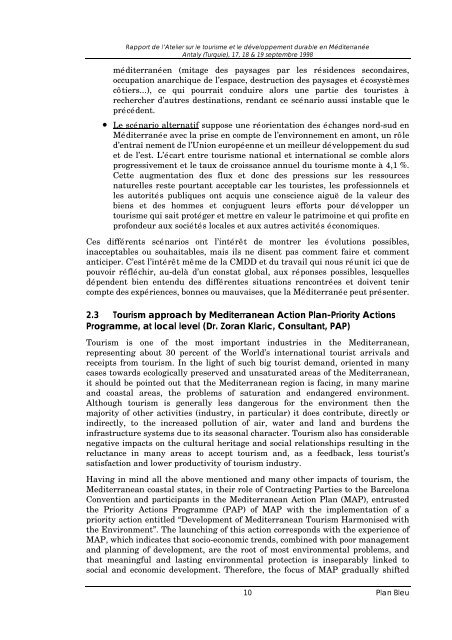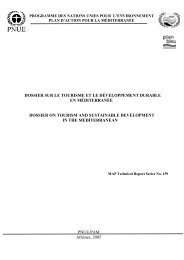MEDITERRANEAN ACTION PLAN
MEDITERRANEAN ACTION PLAN
MEDITERRANEAN ACTION PLAN
You also want an ePaper? Increase the reach of your titles
YUMPU automatically turns print PDFs into web optimized ePapers that Google loves.
Rapport de l’Atelier sur le tourisme et le développement durable en Méditerranée<br />
Antaly (Turquie), 17, 18 & 19 septembre 1998<br />
méditerranéen (mitage des paysages par les résidences secondaires,<br />
occupation anarchique de l’espace, destruction des paysages et écosystèmes<br />
côtiers...), ce qui pourrait conduire alors une partie des touristes à<br />
rechercher d’autres destinations, rendant ce scénario aussi instable que le<br />
précédent.<br />
• Le scénario alternatif suppose une réorientation des échanges nord-sud en<br />
Méditerranée avec la prise en compte de l’environnement en amont, un rôle<br />
d’entraî nement de l’Union européenne et un meilleur développement du sud<br />
et de l’est. L’écart entre tourisme national et international se comble alors<br />
progressivement et le taux de croissance annuel du tourisme monte à 4,1 %.<br />
Cette augmentation des flux et donc des pressions sur les ressources<br />
naturelles reste pourtant acceptable car les touristes, les professionnels et<br />
les autorités publiques ont acquis une conscience aiguë de la valeur des<br />
biens et des hommes et conjuguent leurs efforts pour développer un<br />
tourisme qui sait protéger et mettre en valeur le patrimoine et qui profite en<br />
profondeur aux sociétés locales et aux autres activités économiques.<br />
Ces différents scénarios ont l’intérêt de montrer les évolutions possibles,<br />
inacceptables ou souhaitables, mais ils ne disent pas comment faire et comment<br />
anticiper. C’est l’intérêt même de la CMDD et du travail qui nous réunit ici que de<br />
pouvoir réfléchir, au-delà d’un constat global, aux réponses possibles, lesquelles<br />
dépendent bien entendu des différentes situations rencontrées et doivent tenir<br />
compte des expériences, bonnes ou mauvaises, que la Méditerranée peut présenter.<br />
2.3 Tourism approach by Mediterranean Action Plan-Priority Actions<br />
Programme, at local level (Dr. Zoran Klaric, Consultant, PAP)<br />
Tourism is one of the most important industries in the Mediterranean,<br />
representing about 30 percent of the World’s international tourist arrivals and<br />
receipts from tourism. In the light of such big tourist demand, oriented in many<br />
cases towards ecologically preserved and unsaturated areas of the Mediterranean,<br />
it should be pointed out that the Mediterranean region is facing, in many marine<br />
and coastal areas, the problems of saturation and endangered environment.<br />
Although tourism is generally less dangerous for the environment then the<br />
majority of other activities (industry, in particular) it does contribute, directly or<br />
indirectly, to the increased pollution of air, water and land and burdens the<br />
infrastructure systems due to its seasonal character. Tourism also has considerable<br />
negative impacts on the cultural heritage and social relationships resulting in the<br />
reluctance in many areas to accept tourism and, as a feedback, less tourist’s<br />
satisfaction and lower productivity of tourism industry.<br />
Having in mind all the above mentioned and many other impacts of tourism, the<br />
Mediterranean coastal states, in their role of Contracting Parties to the Barcelona<br />
Convention and participants in the Mediterranean Action Plan (MAP), entrusted<br />
the Priority Actions Programme (PAP) of MAP with the implementation of a<br />
priority action entitled “Development of Mediterranean Tourism Harmonised with<br />
the Environment”. The launching of this action corresponds with the experience of<br />
MAP, which indicates that socio-economic trends, combined with poor management<br />
and planning of development, are the root of most environmental problems, and<br />
that meaningful and lasting environmental protection is inseparably linked to<br />
social and economic development. Therefore, the focus of MAP gradually shifted<br />
10<br />
Plan Bleu
















